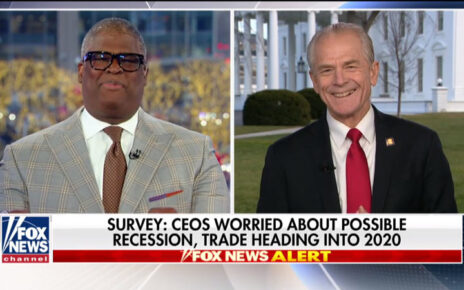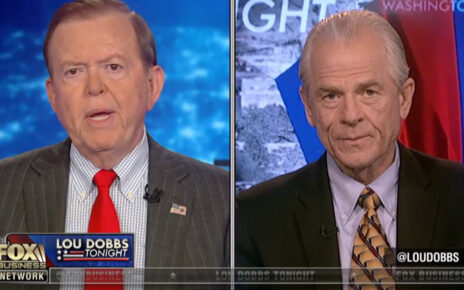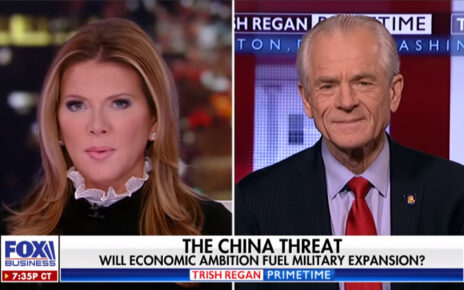U.S. won’t have a future if China continues unfair trade practices, says Trump adviser
White House trade adviser Peter Navarro says that if the U.S. allows China to cheat and steal American intellectual property, “we won’t have a future.” And America has a right, Navarro tells Judy Woodruff, to defend American economic and national security by imposing tariffs on China.
White House trade adviser Peter Navarro says that if the U.S. allows China to cheat and steal American intellectual property, “we won’t have a future.” And America has a right, Navarro tells Judy Woodruff, to defend American economic and national security by imposing tariffs on China. They discuss President Trump’s outlook and the effects on American industries like agriculture.
Read the Full Transcript
Judy Woodruff:
We return now to our lead story, the rising tensions with China over trade.
In the wake of comments by top Trump administration officials today that the tariffs the president announced are subject to negotiations that are under way, I spoke a short time ago with Peter Navarro, a senior adviser to President Trump and director of the White House National Trade Council.
Peter Navarro:
Let’s start with the big picture here.
The big picture here is that China has been stealing our intellectual property for years. When an American company goes to China, they force that American company to surrender its technology to a Chinese competitor.
That Chinese competitor winds up beating the American company, not just in the Chinese market, but around the world. And that’s an unsustainable situation that President Trump has decided to crack down on.
We have a program to do that. It’s not just that China cheats and steals our intellectual property. They’re also coming with large bags full of money to basically buy up the crown jewels of American technology.
And the biggest picture here is China has this thing called China 2025. It’s a policy manifesto which says that they want to take over all of the emerging industries of the future, artificial intelligence, robotics, quantum computing, these things.
And if we allow China doing this, particularly using unfair trade practices, we won’t have a future. And that’s what President Trump is very concerned about. So, when he ordered Ambassador Lighthizer to push forward these tariffs, we’re in a 60-day process to review them and get public comment, per a solid procedure.
And the expectation is at the end of 60 days, there will be tariffs imposed based on that public comment.
Judy Woodruff:
But in the process of, in effect, punishing China for what you’re saying that they have done, you end up with these tariffs, tit for tat tariffs, that people say, it looks like a trade war.
Peter Navarro:
So, let’s be clear. We’re not trying to punish China. China is a superpower. It’s a sovereign nation.
We’re simply saying that China is engaged in these practices. And America, as a sovereign nation, has a right to defend the people of this country in the interest of both economic security, so that we have jobs in the future, but also national security, because a lot of these emerging industries of the further have military implications.
So all we’re doing is imposing tariffs, not to punish China, but to recover — let me be clear about this — but to recover the $50 billion a year in damages they inflict upon this country by engaging in these practices.
Judy Woodruff:
But how do you know that China doesn’t see it a punishment?
Because, yes, that’s how the Trump administration is viewing this, but what China is saying in return is, well, if you’re going to do this, then we’re going to come back and impose something that’s very difficult on your producers, on your agricultural sector, your industrial sector.
Peter Navarro:
Sure. That’s a reasonable thing to bring up as a point.
But let’s be clear about several things. I mean, first of all, China denies it’s engaging in these practices, which everybody knows they do it, so that’s basically a lie to the American people and the world.
But the history of dialogue with China about these practices goes back to 2003 and the Bush administration. We had endless dialogues every year through the Bush and Obama administrations. When President Trump came into office, he invited the Chinese delegation to Mar-a-Lago in April.
And we had another trip in November in 2017, and China simply has not responded to our call to basically trade fairly.
Judy Woodruff:
So, what is the administration’s message to, for example, the farmer, the soybean farmer or the hog farmer in the state of Iowa who, I’m reading the stories today, are looking — there’s one quote of a man representing the Iowa Soybean Association, said, “All this poses an immediate and grave threat to our industry and to all of Iowa agriculture.”
Peter Navarro:
So, Sonny Perdue, great man, secretary of agriculture, has spoken out in strong support of the president’s programs.
And we are trying to put in place measures which will have the backs of our farmers and our ranchers and everybody else in this country. Let’s keep in mind the bigger picture here. Is China trying to pit portions of America against other portions of America with its strategic avenues on these tariffs?
Is that the case? Again, I get back to this issue. China is engaged in these massive practices that harm this country.
Judy Woodruff:
Right. And…
Peter Navarro:
All we’re asking them to do is stop doing it. And what are they doing? Well, so far, they’re not stopping.
Judy Woodruff:
And we have to assume that the larger goal here is to make the U.S. economy even stronger. The question, though, is, in the process of doing that, the U.S. still has an enormous budget deficit that is connected to the trade deficit.
At the same time, the U.S. has this, in effect, symbiotic relationship with China. They buy our debt. We sell them a lot of goods.
Are you trying to change the symbiotic relationship between these two great countries?
Peter Navarro:
So let’s go back to the four points of the growth compass of President Trump.
Every day he gets up, he thinks about how to grow this economy, tax cuts, deregulation, unleashing our energy sector. In the trade space, when we run a $370 billion trade deficit in goods with China and another $150 billion in trade deficit in goods with Europe, what that does is it exports about three million jobs offshore from this country.
It harms our tax base, it keeps our wages down. And this is the kind of thing — see, this is — ultimately, what the president wants is to move from a world of massive structural trade imbalances driven by unfair trade practices to a world where we have pro-growth driven by free trade that is fair and reciprocal.
(CROSSTALK)
Judy Woodruff:
But in the process — if I could just interrupt quickly.
Peter Navarro:
Sure.
Judy Woodruff:
In the process, there are going to be U.S. industries, will it’s agriculture or others, that are going to be hurt by this, not to mention the relationship the U.S. has with allies who we count on for other reasons, for security reasons.
Peter Navarro:
The president has the back of every American in this country.
And the team here is united across the Cabinet agencies and within the perimeter of the White House that, on this issue, on China, with respect to cheating and theft of our intellectual property, if we don’t do what we’re doing now, then we are going to lose our future economically, and we’re going to face national security risks.
I mean, remember, when China joined the World Trade Organization in 2001, they promised to play by the rules. They didn’t. They grew from $1 trillion GDP to $12 trillion. And, in the meantime, we lost 60,000 factories, over five million manufacturing jobs, wages stagnated and our growth rate was cut almost in half.
That’s on China. And President Donald Trump is very different about that. He sees this chessboard and he knows what to do for the further of America, and that’s the bigger framing issue here. And we’re working very hard on behalf of the American people to get this right.
Judy Woodruff:
Peter Navarro, senior adviser to President Trump, thank you very much.
Peter Navarro:
It’s a pleasure to be on. Next time in studio, I promise.



